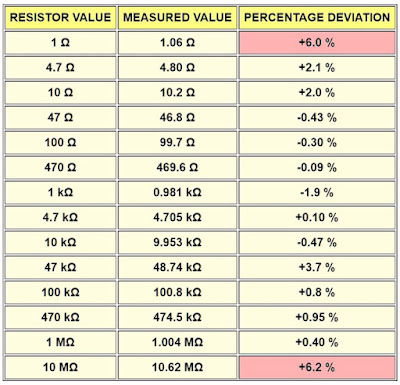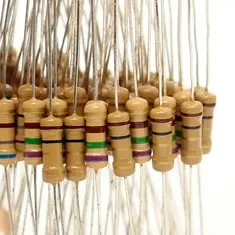Which resistors do you need?
Various choices possible
Resistors are available in values from 0.1 Ω to 10 MΩ, in power ratings from 1/8 W to 2 W, with tolerances from 1 % to 20 % and made of carbon film or metal film. You can also choose between 'old-fashioned' axial resistors with wires and the modern SMD resistors that you will find in every modern device. What's a good selection to start with?
The values
The range of 0.1 Ω to 10 MΩ can be divided into a number of 'decades', for example from 10 kΩ to 100 kΩ. In each decade, a number of values have been defined that must be made by the manufacturers. These series are called the 'E-series'.
To start the E-12 series is good enough, you can then choose from twelve resistors from each decade and when designing and experimenting with simple circuits, that choice is sufficient.
The power rating
Nowadays resistors of 1/4 watt or even 1/8 watt are standard. However, we recommend the use of 1/2 W types. These are not too big but also not too small and are ideal for use in experimenting circuits on strip boards. All connecting wires are so far apart that you can measure without problems in the circuit and all connections are easily accessible with your measuring probes. In addition, the four colour rings on these resistors are easy to read with the naked eye.
 |
| Axial resistors of 1/8, 1/4, 1/2, 1 and 2 W compared to a 1 cm by 1 cm square. (© 2019 Jos Verstraten) |
We can be brief about this: resistors with an accuracy of 5 % are good enough for almost all the circuits you are going to solder.
Carbon film or metal film?
Metal film resistors are more stable than carbon film resistors and can be manufactured with smaller tolerances. In your hobby lab, however, you can work very well with the old, familiar beige carbon film resistors.
Radial or SMD resistors?
There is only one short answer: SMD resistors are completely unsuitable for experimenting with circuits. Buy resistors with connecting wires.
 |
| SMD resistors compared to a 1/2 W axial resistor. (© 2019 Jos Verstraten) |
One thousand resistors for ten euros
Various resistors assortments available
If you google on 'resitor assortment', various assortments are offered in prices varying from € 2,57 to € 30,00. We selected a package of Banggood (see sponsor-ad at the end of this article), costing a little over ten euros, in which you will find 1.000 1/2 W carbon film resistors with 100 different values and 5 % tolerance. This means that you will receive ten pieces of each value.
The price
The unit price is therefore around one eurocent per resistor, a price that is spectacularly low. By way of comparison:
- Reichelt Elektronik: € 0.08 each.
- TEM Electronic Components: € 0.02 each.
- Conrad Electronic: € 0.08 each.

The delivery
The package was ordered on 05-04-2019 and received by postnl in The Netherlands on 08-05-2019. A delivery time of more than one month, not unusual for this type of deliveries from China. As usual, hardly any attention is paid to packaging. In order to save as much shipping volume as possible, the hundred strips, each with ten resistors, have been crammed together in a far too small plastic bag. The result is that dozens of resistors are pushed out of the strips and are loose in the package.
The resistance value is printed on the tape of the strips, so that you can easily find a certain value, even without knowledge of the colour code.
 |
| The resistors are packed in a far too small plastic bag. (© 2019 Jos Verstraten) |
The table below provides a clear summary of the values supplied for each decade. It is a pity that there are delivered ten pieces per value. Resistances of 1 Ω or 10 MΩ are not often used in practice. If such not often applied values had been supplied a little less, there would have been room to supply some more copies of values that you will be using daily, such as 1 kΩ or 47 kΩ.
 |
| Overview of the delivered values. (© 2019 Jos Verstraten) |
One value, 180 kΩ, was not present in the package delivered to us, but two strips of the value 150 Ω were delivered.
The specifications of the supplied resistors
The supplied resistors are of excellent quality and fortunately still have the familiar beige background color on which you can clearly distinguish all ten colors of the coding. The dimensions of the resistors are summarized in the picture below.
 |
| The dimensions of the supplied resistors. (© 2019 Jos Verstraten) |
You may not yet know how the value of a resistor is encoded by means of coloured rings. Learning this color code by heart will save you a lot of time and frustration! The supplied resistors are coded in the standardized way by means of four colored rings. The last ring has a golden colour and that means that the resistor has a tolerance of ±5 %. The first three rings define the value of the resistor in the way that is explained in the picture below. The first two rings give the digits of the value, the third ring gives a multiplication factor. In the illustrated example (yellow-purple-red), a value of 47 times one hundred is equal to 4,700 Ω or 4.7 kΩ. After some months of daily work with electronics, you know these often used color codes by heart!
 |
| The colour coding of the supplied resistors. (© 2019 Jos Verstraten) |
The resistors tested
The accuracy
We have selected fourteen out of the total of one thousand resistors and measured their value with an accurate meter. Of course we have calculated the accuracy. As can be seen from the table below, the resistors supplied are of excellent quality in terms of tolerance. Only the 1 Ω and 10 MΩ resistors had a larger deviation than the permitted ±5 %. But maybe that's because our meter has a larger deviation at such extreme values.
 |
| A test of the tolerance on the resistance values. (© 2019 Jos Verstraten) |
In a working electronic circuit, electrical power is consumed, with the result that almost all the components heat up to a greater or lesser extent. This also happens with the resistors and it is the intention that the value of a heating resistor remains reasonably stable. The value of a resistor, however, is slightly dependent on the temperature. This is called the 'temperature coefficient', with the pet name 'tempco'. Carbon film resistors have a negative tempco. This means that the value will decrease when the resistor becomes hot. We selected a 1 kΩ from the package and heated it very slowly from 20 °C to 70 °C. The temperature of the resistor was measured with an accurate thermocouple meter.

In the graph below we have shown the behaviour of the resistance value. This shows that the supplied resistors indeed have a negative tempco, but that the value when heated to 70 °C is within the tolerance of the resistor. A resistance of 1 kΩ with a tolerance of ±5 % may have a value between 0.95 kΩ and 1.05 kΩ. The selected resistor had a value of 0.986 kΩ at 20 °C, a value that decreased to 0.961 kΩ at 70 °C. In short, also in this respect the supplied resistors are perfect!
 |
| A test of the temperature coefficient of the resistors. (© 2019 Jos Verstraten) |
Our opinion about this resistor assortment
If you start tinkering with electronics and still have to buy everything, this assortment of resistors is an excellent first purchase. For ten euros you will get enough resistors to start working.


